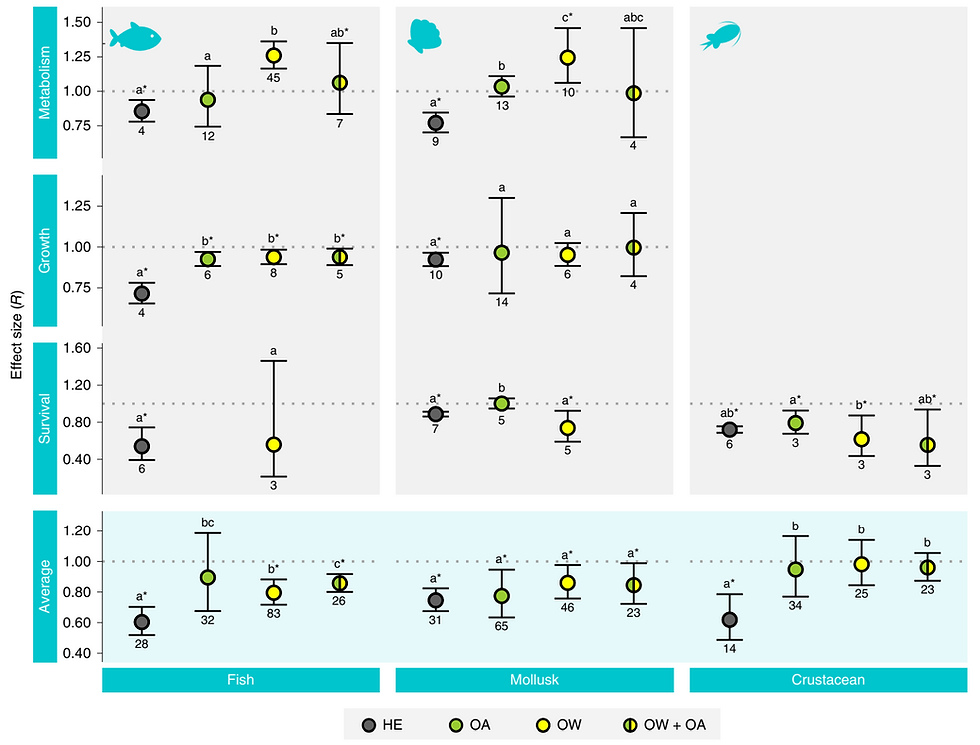Understudied Ocean Deoxygenation Threatens Marine Life
- Seasquatch Outdoors
- Jan 21, 2021
- 2 min read
Article: Impacts of Hypoxic Events Surpass Those of Future Ocean Warming and Acidification by Sampaio and colleagues (2020)
Background: Human activity considerably enhances the release of greenhouse gases (e.g., carbon dioxide) into the atmosphere, which directly leads to several negative impacts on the environment. The ocean, perhaps the most affected environment, helps to absorb much of the carbon dioxide released into the atmosphere. Although this buffers the rate of global warming, gradual, yet severe, consequences still proceed. As such, the Intergovernmental Panel on Climate Change (IPCC) predicts that by 2100 ocean temperatures will increase by 4oC, sea surface pH will decrease by 0.4 units, and dissolved oxygen concentrations will decrease by 5%. The latter, ocean deoxygenation, is largely understudied in the field of global change ecology and requires further research to determine how marine life of the future will be impacted by climate change. Thus, Sampaio and colleagues aim to analyze the effects of dissolved oxygen loss on marine biological processes across specific taxonomic groups and climatic regions.
Methods: Sampaio and colleagues retrieved data from over 100 studies analyzing the effects of ocean warming (OW), ocean acidification (OA), and ocean deoxygenation (HE) on marine biological activity. By combining data from multiple studies, the results provide more statistical power than when analyzed alone. Biological responses (development, metabolism, growth, reproduction, survival, and abundance) of fish, mollusks, and crustaceans at various life stages were analyzed in both tropical and temperate climates.
Findings: With respect to biological processes, Sampaio and colleagues found that ocean deoxygenation results in a stronger overall inhibition (-34%) as compared to ocean acidification (-15%) and ocean warming (-16%). For marine life experiencing ocean deoxygenation, survival decreases by 33%, abundance decreases by 65%, and growth decreases by 24%. Further, across the three taxonomic groups and both climate regions, ocean deoxygenation is the most pervasive inhibitor of survival, growth, and metabolism compared to ocean warming and ocean acidification.
Conclusions: Despite clear evidence presented by Sampaio and colleagues that ocean deoxygenation impacts marine life biological responses across multiple taxonomic groups and climate regions, there is little ongoing research on the topic. Although a difference of 5% of dissolved oxygen seems minute, it will likely result in extreme negative impacts on future marine habitats. Most of the studies integrated did not provide data on experimental conditions involving a combination effect of ocean warming, acidification, and deoxygenation. Therefore, one could imagine how much more detrimental the combination of this ‘deadly trio’ might be. The only way to prevent these serious impacts to the biodiversity and functioning of our oceans is to drastically reduce our carbon emissions. If we each do our part in the fight against climate change we can help ensure a healthier ocean for the future.

Figure: The effect of ocean deoxygenation (HE), ocean acidification (OA), ocean warming (OW), and the combination of OW and OA on marine biological processes (survival, growth, metabolism). Circles below, above, or at 1.00 (dotted line) reflect an inhibition, enhancement, or no effect, respectively, on the specified biological process.
Reference:
Sampaio, Eduardo, et al. "Impacts of hypoxic events surpass those of future ocean warming and acidification." Nature Ecology & Evolution (2020): 1-11.







Comments